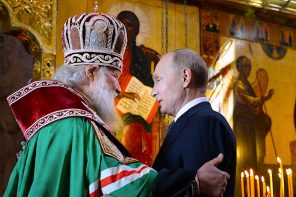According to the Facebook page of Russian journalist Mikhail Kaluzhskii (by way of popular Russian website Lenta.ru) a staged performance of last year’s sensational Pussy Riot trial has been interrupted by the Russian Federal Migration Service. According to the report, the FMS first demanded to see the papers of the Swiss director of the performance, Milo Rau, and then declared they would check the papers of every foreigner in attendance.
“Moscow Trials,” consists of three parts, performed one per day from March 1-3. The first two parts, “Caution, religion!” and “Forbidden Art” apparently went off without a hitch, while the final installment, “Pussy Riot,” has been interrupted indefinitely. Ekaterina Samutsevich, who took part in the “punk prayer” in Moscow’s symbolically significant Cathedral of Christ the Savior, and who was freed on appeal in October, was among the performers. Marking the one-year anniversary of the performance that got her arrested along with Maria Alyokhina and Nadezhda Tolokonnikova—both of whom are still serving time in penal colonies—Samutsevich has recently declared that she has no regrets.
The interrupted performance serves to illustrate how the original Pussy Riot incident, covered here at RD on the day the verdict was read out, continues both to attract the attention of Western intellectuals and artists and to be a thorn in the side of Russian authorities and the Russian Orthodox Church.
Here in Russia, where a September poll revealed that 78% of the population found the Pussy Riot verdict either “appropriate” or “insufficient,” and only 14% found it “excessive,” there seems to be little hope for a meaningful dialogue between those on opposite sides of the issue.
In my view, while a post-Cold War bias has colored the Western media’s representation of the whole Pussy Riot affair, the excessive punishment levied by the Russian court system has played right into the hands of the regime’s (and the Church’s) critics; the interruption of a theatrical portrayal of the trial is likely to do the same. Had the authorities ignored the play, it would surely have received less international attention than it will now, thanks to this obtrusive suppression of speech.




